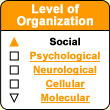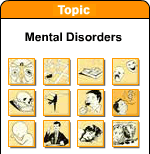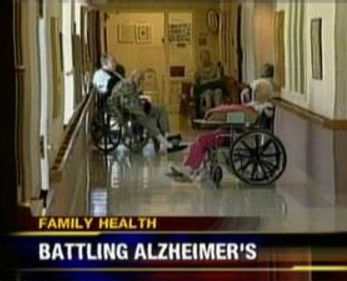|
|

 |
 |

 |
When Alzheimer’s is diagnosed, it will generally not be the person himself or herself who first requested a medical consultation, but rather a family member, such as a spouse or an adult child, who has noticed the person’s memory problems. The person himself or herself often seems to notice these problems less or to be less concerned about them, which represents a form of anosognosia.
Before delivering a diagnosis of Alzheimer’s, physicians should take the time to develop trusting, empathetic, supportive relationships with their patients. Then they will be able to give them detailed explanations that are suited to the characteristics of the particular culture they come from. Physicians should also try to reduce the shock of the diagnosis by stressing that many people with Alzheimer’s continue to lead active, interesting lives. Lastly, physicians should see to it that a well organized team, often including family members and self-help groups, quickly takes charge of the person’s care.
In turn, the members of this team must be informed about the best ways of communicating with people with Alzheimer’s, arranging their living space,
etc. |
Too often, when telling patients that they have Alzheimer’s, medical practitioners still place too much stress on the loss of cognitive abilities.
The patients will then react to the diagnosis according to their own culture and to their own relationship to cognition and memory within that culture.
For example, this diagnosis will have less of an impact in Chinese-Canadian families, because their culture tends to regard the memory and behaviour problems associated with Alzheimer’s as part of the normal aging process.
But in other cultures, such as Réunion Island, the expression “to have memory” means to be in good mental health, to be self-aware, and to have self-control. Thus it is no surprise that for people from this culture, being told that they are going to gradually lose their memory represents a terrible sentence, and it is not unusual for them to simply reject the diagnosis outright. |
|
|
| FAMILY AND SOCIAL SUPPORT |
|
Alzheimer’s is the most prevalent form of dementia. Age
is the main risk factor for Alzheimer’s, and life expectancy depends on the person’s age at the time of diagnosis. This condition develops over a number of years, in the course of which many of the person’s cognitive faculties decline.
Being given the diagnosis (see sidebar) is thus the first challenge that people with Alzheimer’s must face.
Before that, to try to rationalize the cognitive deficits that they have begun experiencing, they may have offered themselves various other explanations, such as simply being tired. Once they have been given the diagnosis, they will have to do some psychologically difficult work to admit what is happening to them. At this point, some Alzheimer’s patients will start to discuss their condition more openly, while others will not. But all of them seem to develop some kind of strategy to continue to preserve their sense of identity and continue to give meaning to their lives.
Philosophers who have analyzed the statements of people with Alzheimer’s have distinguished two “selves” in their identities. One of these selves is bound up with the individual’s personal history: despite their memory problems, many people with Alzheimer’s can still perceive what is happening to them as part of their own life story. This self remains relatively intact. It is the “I” whom these people still refer to in their speech.
The second “self” is the public aspect of the individual’s personality. This self may be greatly diminished, because people with Alzheimer’s end up no longer able to play their usual social roles. How much of this “social self” is lost will depend largely on how other people perceive and interact with the person who has Alzheimer’s.
The importance of other people’s perceptions raises the issue of the social representation of Alzheimer’s, which is unquestionably one of the mental disorders that receive the most media attention. Many of the messages conveyed about Alzheimer’s in the media are catastrophizing. The metaphors and images that they employ usually depict the most disturbing aspects of Alzheimer’s disease, which can only generate intense anxiety about it.
These messages reflect the well known propensity of the mass media to sensationalize—in this case, by almost always portraying people who are in the most advanced stages of Alzheimer’s. People who are in the earlier stages of the illness and still retain many of their faculties apparently are not sufficiently “mediagenic”. As a result, people with Alzheimer’s are usually depicted as very passive, and their diminished abilities are shown with a heavy hand.
Hence it is no surprise that a study of the concerns of people with Alzheimer’s nine months after they had been told their diagnosis showed that they were afraid of being pitied and humiliated, of no longer being listened to, or of quite simply “going crazy”. They also often experienced a sense of shame that made them ask their families to hide their diagnosis from their friends.
Researchers such as Peter
Whitehouse stress the tremendous power that words and labels have in our lives. These authors believe that we should stop portraying the diagnosis of Alzheimer’s as having such apocalyptic implications for a person’s future. Instead, they say, we should think in terms of capacities preserved, because people with cognitive disorders maintain the potential for personal growth throughout their years of decline.
But for such people to realize their potential, our societies have to learn how to again accept aging and the decline of mental faculties as a stage of life. In this cognitive-disorders-accepting society, “Alzheimer’s people” will then be able to find a place where they can still have a purpose in life, such as through intergenerational projects.
In the meantime, after people receive a diagnosis of Alzheimer’s, the attitude of the family members who are caring for them can contribute greatly to their well being. Maintaining good communication with them is especially important, because one of the most important ways of maintaining their social ties is simply to give them opportunities to talk about themselves. Conversely, if people with Alzheimer’s are infantilized, intimidated, or stigmatized, it lowers their self-esteem and increases the risk of their becoming socially isolated. Many studies have also shown the benefits of letting people with Alzheimer’s remain as long as possible in their homes where they have their familiar habits. At advanced stages of the disease, however, this sometimes becomes impossible.
Another way to help people with Alzheimer’s maintain their sense of identity as individuals shaped by their past and their present is to encourage them to engage in activities suited to their personalities and interests—for example, musical activities, if music has always been an important part of the person’s life. Helping the individual to keep a journal, in which they tell the story of their lives, illustrated with photos that are meaningful for them, can also stimulate autobiographical memories and thus help to preserve cognitive faculties in general.
|
|





